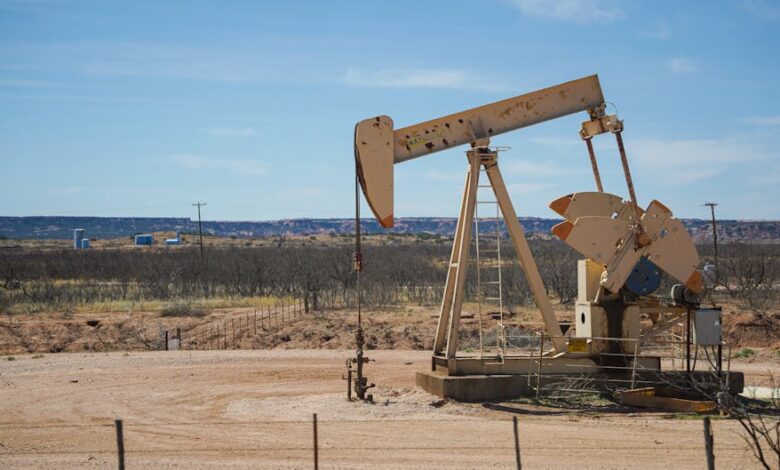*Shale Oil Extraction and Fracking: Transforming the Global Oil Market and OPEC Dynamics*

The extraction of crude oil from shale formations has transformed the landscape of the global oil market, reshaping both supply chains and geopolitical dynamics. At the heart of this revolution is hydraulic fracturing, or fracking technology, which has enabled energy companies to unlock vast reserves of shale oil previously deemed inaccessible. As the world grapples with fluctuating oil prices and evolving energy security concerns, understanding the role of shale oil in the context of oil market trends becomes increasingly crucial. This article delves into the multifaceted implications of shale oil production, from its impact on global oil trade and OPEC strategies to the environmental considerations that accompany its extraction. We will explore how the rise of shale oil is influencing oil consumption patterns, the balance between traditional fossil fuels and emerging biofuels, and the future of sustainable oil alternatives. Join us as we navigate the complexities of oil geopolitics and the advancements in oil technologies that are shaping the future of energy.
- 1. **Understanding Shale Oil: The Role of Fracking in Modern Oil Extraction**
- *Explore how hydraulic fracturing technology has revolutionized the extraction of crude oil from shale formations and its implications for the global oil market.*
- 2. **Shale Oil and Global Oil Trade: Impact on Prices and OPEC Dynamics**
1. **Understanding Shale Oil: The Role of Fracking in Modern Oil Extraction**
Shale oil has emerged as a pivotal player in the global oil market, transforming how crude oil is extracted and influencing oil prices and energy security. Understanding the role of fracking technology is essential to grasping the impact of shale oil on the oil industry.
Fracking, or hydraulic fracturing, is a method used to extract oil and natural gas from deep underground shale formations. This technology has revolutionized oil exploration, particularly in regions rich in shale reserves, enabling access to vast amounts of previously untapped resources. As a result, the United States has significantly increased its shale oil production, reshaping global oil trade dynamics and altering the balance of power within OPEC and other oil-producing nations.
The extraction process begins with drilling vertically into the earth and then horizontally through shale formations. A mixture of water, sand, and chemicals is injected under high pressure to create fractures in the rock, allowing oil and gas to flow more freely to the surface. This innovative extraction technique has not only boosted oil supply chains but has also raised discussions about the environmental impact of oil production. Concerns regarding water usage, potential groundwater contamination, and seismic activity associated with fracking have led to ongoing debates about oil regulation and compliance.
As shale oil continues to flow into the market, its influence on oil prices and consumption patterns is undeniable. The increased supply can lead to lower oil prices, benefiting consumers but challenging traditional oil producers who may struggle to compete. Oil price hedging strategies have become more important for investors and companies alike, as volatility in oil markets can significantly affect profitability.
Moreover, the rise of shale oil has implications for downstream oil processes, including oil refining and petrochemicals. The integration of shale oil into existing oil storage and transportation infrastructures has also prompted advancements in oil field services and oil technologies, focusing on efficiency and sustainability.
While shale oil presents opportunities for energy independence and security, it has also sparked interest in oil alternatives, such as biofuels, as the industry grapples with the long-term sustainability of fossil fuels. As global oil consumption trends evolve, the interplay between shale oil and other energy sources will shape the future landscape of the energy sector.
In summary, the role of fracking in extracting shale oil is a critical component of modern oil exploration and production. Its effect on oil prices, market trends, and the geopolitics of oil cannot be overstated, as it continues to influence the dynamics of the global energy landscape.
*Explore how hydraulic fracturing technology has revolutionized the extraction of crude oil from shale formations and its implications for the global oil market.*
The advent of hydraulic fracturing technology, commonly known as fracking, has dramatically transformed the landscape of crude oil extraction, particularly from shale formations. This revolutionary method involves injecting high-pressure fluid into the ground, creating fractures in the rock and allowing oil to flow more freely. As a result, shale oil production has surged in recent years, significantly contributing to the global oil supply and reshaping oil market trends.
Shale oil has emerged as a viable alternative to traditional offshore drilling methods, leading to a more diversified approach to oil exploration and extraction. This shift has increased the United States' energy security, as the nation has become one of the largest producers of crude oil globally. The rise in shale oil production has directly impacted oil prices, often leading to fluctuations that reflect changes in supply and demand dynamics within the global oil trade.
Moreover, the boom in shale oil has implications for OPEC and its influence over oil prices. With more countries engaging in shale oil extraction, OPEC's ability to control the market through production cuts has been challenged. This has led to increased competition, driving innovation in oil technologies and extraction methods, which in turn affects oil compliance and regulation standards across various jurisdictions.
The implications of fracking extend beyond just oil supply; they also touch on environmental concerns. The environmental impact of oil extraction, including potential contamination of water sources and increased greenhouse gas emissions, has sparked debates about the sustainability of relying on fossil fuels. As the world grapples with climate change, the search for oil alternatives, such as biofuels, has gained traction, and discussions around the development of oil sands have become more prevalent.
In terms of oil storage and transportation, the increase in shale oil production necessitates the expansion of oil supply chains and infrastructure, including oil pipelines and storage facilities. The rise in domestic production has also influenced oil price hedging strategies among investors, who must navigate the complexities of a rapidly evolving market landscape.
In conclusion, hydraulic fracturing technology has not only revolutionized crude oil extraction from shale formations but has also significantly impacted the global oil market, influencing everything from oil consumption patterns to geopolitics. As the world continues to explore the balance between oil and alternative energy sources, the implications of shale oil extraction will remain a critical focal point for investors, policymakers, and environmental advocates alike.
2. **Shale Oil and Global Oil Trade: Impact on Prices and OPEC Dynamics**
The emergence of shale oil has significantly reshaped the landscape of global oil trade, influencing oil prices and the dynamics within OPEC (Organization of the Petroleum Exporting Countries). As shale oil extraction techniques, particularly hydraulic fracturing, have advanced, countries like the United States have seen a boom in production. This surge has disrupted traditional oil supply chains and altered the balance of power in the oil market.
One of the most immediate impacts of increased shale oil production has been on oil prices. With the U.S. becoming one of the leading producers of crude oil, the global supply of oil has expanded, leading to fluctuations in oil prices. As shale oil competes with conventional offshore drilling and oil sands, the interplay between these different sources of crude oil plays a critical role in oil price hedging strategies employed by investors. This increased competition has often resulted in lower oil prices, placing pressure on OPEC to adjust its production levels to stabilize the market.
OPEC's response to the rise of shale oil has been multifaceted. The organization has had to navigate the complexities of oil geopolitics, as its member countries face the challenge of maintaining market share while also addressing the environmental impact of oil production. OPEC has sometimes opted to cut production to prop up prices, a move that is increasingly necessary given the rise of biofuels and oil alternatives that threaten to take a share of the market.
Moreover, the energy security implications of shale oil cannot be overstated. Countries with substantial oil reserves can leverage their resources to influence global oil market trends. This creates a dynamic where oil consumption patterns shift, pushing for more efficient oil refining processes and advancements in oil technologies. As nations seek to bolster their energy security, investments in oil field services and oil storage become vital components of their strategies.
The future of the oil market is likely to see continued evolution, with shale oil remaining a key player. As global oil trade adapts to these changes, stakeholders must stay attuned to the ongoing developments in oil regulations and compliance, ensuring they navigate the complex landscape of oil exploration and production effectively. Understanding these factors is crucial for informed oil investing and for anticipating the next shifts in oil prices and market dynamics.
In conclusion, the extraction of shale oil through hydraulic fracturing has significantly transformed the landscape of the global oil market. As we have explored, this innovative technology not only enhances the efficiency of crude oil extraction from shale formations but also plays a pivotal role in shaping oil market trends. The rise of shale oil has impacted oil prices, altered OPEC dynamics, and contributed to the complexity of global oil trade, ultimately influencing energy security around the world.
As countries navigate the intricacies of oil consumption and oil geopolitics, the implications of shale oil extraction extend beyond immediate economic benefits. The environmental impact of oil production and the need for oil regulation remain pressing concerns, urging stakeholders to explore oil alternatives, including biofuels and renewable energy sources.
Investors in the oil sector must stay informed on the evolving landscape of oil technologies and oil field services while carefully considering oil price hedging strategies. As we look to the future, the interplay between shale oil, offshore drilling, and other oil extraction methods will continue to define the global energy narrative. By understanding these dynamics, we can better anticipate trends in oil refining, oil transportation, and downstream oil processes, ensuring that we are prepared for the shifts in oil supply chains and the broader implications for the petrochemical industry.
Ultimately, the shale oil revolution underscores the importance of adapting to change while considering the balance between economic growth and environmental stewardship. As we move forward, it is crucial for policymakers, investors, and industry leaders to prioritize sustainable practices that align with the global push towards energy security and compliance with environmental standards. The future of oil—and our reliance on it—will depend on our ability to innovate responsibly and adapt to the challenges that lie ahead.





